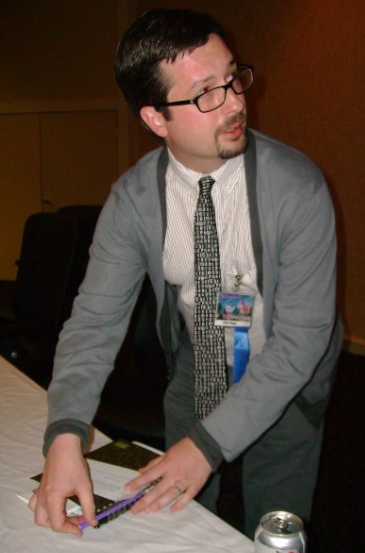Erin Haire is the manager of the Hub City Bookshop, an independent bookstore run by the Hub City Writers Project.
As a retail bookseller, one of the most exciting aspects of my job is interacting with authors. The relationship between authors and booksellers, ideally, is mutually beneficial. We have a common goal: sell some books. As a bookseller, I’m much more likely to do that with an involved and enthusiastic author.
In the spirit of continued goodwill between authors and booksellers, here is some advice from a fairly successful independent bookseller to authors who are getting their start.
1. Be nice. Do you really catch more flies with honey than with vinegar? Absolutely. This is the most important and least frequently heeded advice I give to authors, especially those just starting out. A good attitude and friendly demeanor will open a whole lot of doors when dealing with retail professionals. When you work in customer service, you have to deal with some unhappy, rude folks. It’s just comes with the territory. If you make it your business to avoid the ranks of the disgruntled masses, my gratitude will get you one step closer to having your book on my shelves. On the other hand, if you get me on the phone and tell me that you don’t think I was raised right because I haven’t had time to review your memoir, I’m not stocking it. Period.
Once your book is in the store, there is nothing that makes me happier than selling books by authors I know to be genuinely nice people. Most other booksellers I know feel the same way, so be nice to them. Also, be nice to the reps at your publisher, because they’re the ones selling the books to us. Generally, just be nice.
2. Make sure your book is available. This sounds like a no-brainer, but the easier it is to get your book the better. If you know the name of the sales rep I should be dealing with at your publisher, put his or her phone number in the packet you send. If it’s available from a wholesaler like Baker and Taylor or Ingram, make that clear up front. If you’re self-published or with a very small publisher, I strongly recommend making sure that at least one of the big wholesalers carries your book. If the book sells and the only way I can get more is to call you directly, it may or may not be worth my time to get a hold of you.
3. Include all pertinent information when you make first contact. Did you go to high school two blocks from my store? Has your family lived in our town for a hundred years? Do you teach at a local elementary school? Is your cover art a photo of a local landmark? If so, please tell me! Mind reading is not an ability included on my admittedly impressive resume of personal skills. If there is a particular reason you think your book will do well in my store more than others, lead with that. Well, introduce yourself first, and then tell me about your mother’s book club that meets down the street and has a hundred members that are all dying to buy your book. Remember, I like selling books just as much as you do.
4. Get on Twitter. This might sound like silly advice and you might think it’s not for writers who are serious about their craft, but get over that attitude quick. Yes, Jonathan Franzen doesn’t like Twitter, but he doesn’t need personal contact with booksellers to ensure we stock his book. After you win the National Book Award, maybe Twitter becomes a bit redundant. In any other case, it can be an invaluable tool. Twitter allows you access to a community of people who successfully work in the book business. Publishers, editors, agents, bloggers, booksellers, and authors are all represented. Participating in a community of like-minded people will feed you creatively and professionally, and Twitter is a very easy way to get involved.
Hopefully these tips will offer some insight into the minds of independent booksellers. I think that the folks who make an effort with booksellers without a doubt have more successful events, more publicity for their books, and higher sales. We love books, and we are constantly looking for the next fantastic piece of literature to champion and the next great author to get excited about. Be committed to your work, because we’re committed to books. Also, be nice.
 Matt Staggs is a literary publicist and the proprietor of Deep Eight LLC, a boutique publicity agency utilizing the best publicity practices from the worlds of traditional media and evolving social technologies. He has worked in the fields of public relations and journalism for almost a decade. In addition to his work as a publicist, Matt is a book reviewer and writer whose work appears in both print and web publications.
Matt Staggs is a literary publicist and the proprietor of Deep Eight LLC, a boutique publicity agency utilizing the best publicity practices from the worlds of traditional media and evolving social technologies. He has worked in the fields of public relations and journalism for almost a decade. In addition to his work as a publicist, Matt is a book reviewer and writer whose work appears in both print and web publications.